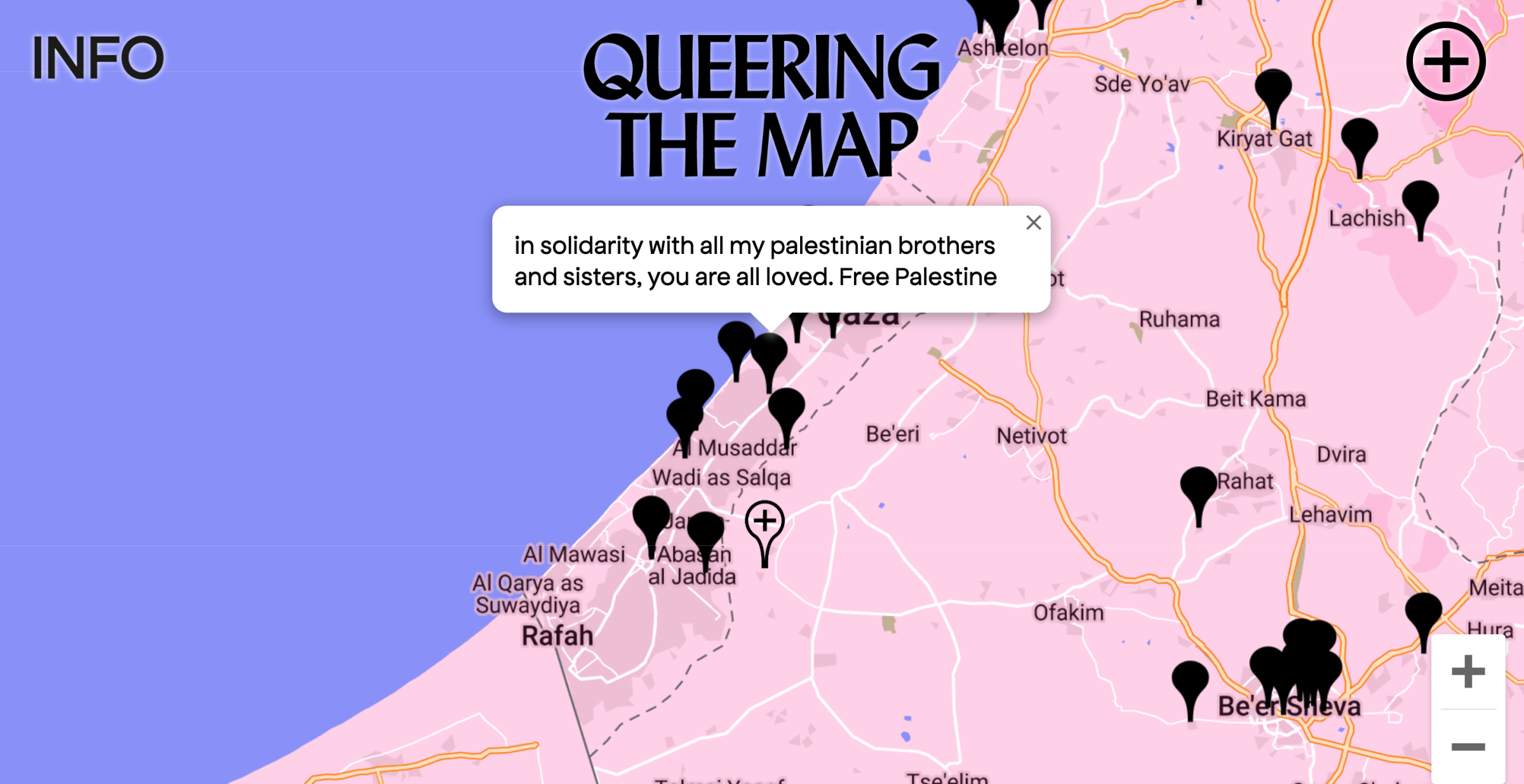
These days, it’s not easy for anyone living in Gaza. Hardly any safe refuge can be found amid Israel’s unrelenting airstrikes of the territory in retaliation to Hamas’ terrorist attack on Oct. 7.
But for LGBT Gazans, the specter of death from the Israel-Hamas war only compounds what was already a struggle to live freely in a place where homosexual relations between men is outlawed and open queerness violates social and religious mores.
Amid the dual threats of escalating violence and ongoing repression, a six-year-old interactive site started in Canada has emerged to provide the world a rare glimpse of the perspective of members of Gaza’s LGBT community.
Queering the Map, a moderated platform founded in 2017 by Lucas LaRochelle in Montreal, allows LGBT-identifying users to make anonymous geotagged posts. The pink-colored atlas of community-sourced anecdotes, ranging from the raunchy to the heart-rending, has charted experiences across the world, in at least 28 languages.
More From TIME
There are no timestamps on the messages, making it difficult to know when they were posted. Some share a general portrait of living as an LGBT person in the enclave.
“I know I was different from a young age. I knew I liked boys early on. But society demands it remains hidden. I live elsewhere now and I'm still trying to connect the dots. I wish things weren't this complicated. I don't want to hurt my family, but I cannot live a lie,” one post reads.
A post written in Arabic, geotagged in Central Gaza, reads: “The only thing that keeps me patient in Gaza is the sea and you.”

Another, posted at the edge of a pier, reads: “A place [where] I kissed my first [crush]. Being gay in Gaza is hard but somehow it was fun. I made out with a lot of boys in my neighborhood. I thought everyone is gay to some level.”

Many messages geotagged within Gaza express solidarity with the decades-long cause of Palestinian liberation.
Near the Nuseirat refugee camp, which was targeted by an apparent Israeli airstrike on Tuesday, one post reads: “In solidarity with all my Palestinian brothers and sisters, you are all loved. Free Palestine.”
Another post from the southern city of Khan Younis, where hundreds of thousands of Gazans fled to after evacuation orders in the north and which has also been bombarded by air raids, reads: “Pls know despite what the media says there are gay Palestinians. We are here, we are queer. Free Palestine.”
Other messages are even more heartbreaking.
“I’ve always imagined you and me sitting out in the sun, hand and hand, free at last. We spoke of all the places we would go if we could,” reads a post tagged in the northern city of Jabalia, where a series of Israeli missiles last week destroyed a refugee camp and reportedly killed dozens of people. “Yet you are gone now. If I had known that bombs raining down on us would take you from me, I would have gladly told the world how I adored you more than anything. I’m sorry I was a coward.”

Another post, which TIME could not verify on the Queering the Map site but may have existed and later been removed, made the rounds on social media in recent days. Apparently tagged in the northern part of the Gaza Strip, it read, according to screenshots: “Idk how long I will live so I just want this to be my memory before I die. I am not going to leave my home, come what may. My biggest regret is not kissing this one guy. He died two days back. We had told how much we like each other and I was too shy to kiss last time. He died in the bombing. I think a big part of me died too. And soon I will be dead. To younus, i will kiss you in heaven.”
Queering the Map allows content to be taken down upon request, and founder LaRochelle said in an interview that moderators block messages that include specific personal details like first and last names. (Queering the Map has not responded to TIME’s request for comment.)
More Must-Reads From TIME
- The 100 Most Influential People of 2024
- Coco Gauff Is Playing for Herself Now
- Scenes From Pro-Palestinian Encampments Across U.S. Universities
- 6 Compliments That Land Every Time
- If You're Dating Right Now , You're Brave: Column
- The AI That Could Heal a Divided Internet
- Fallout Is a Brilliant Model for the Future of Video Game Adaptations
- Want Weekly Recs on What to Watch, Read, and More? Sign Up for Worth Your Time
Contact us at letters@time.com